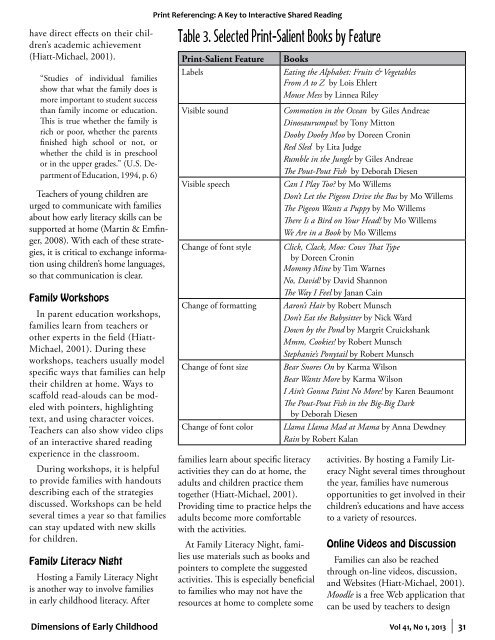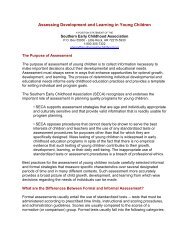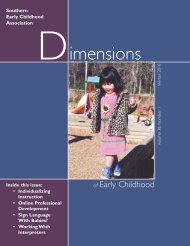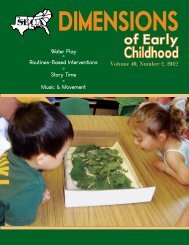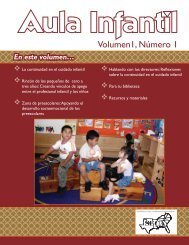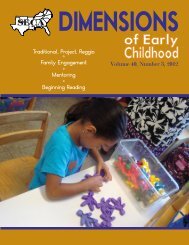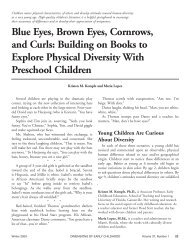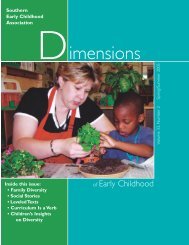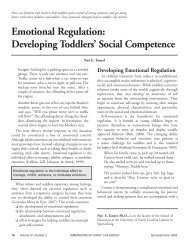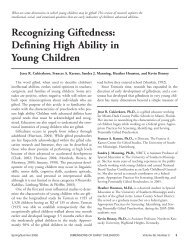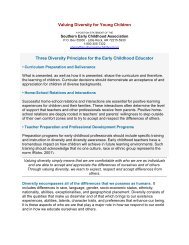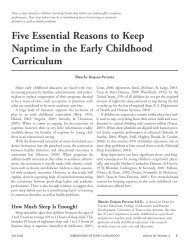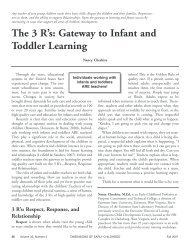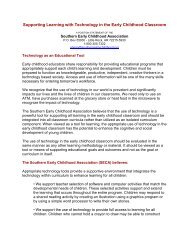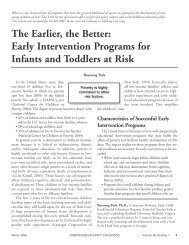Print-Referencing - Southern Early Childhood Association
Print-Referencing - Southern Early Childhood Association
Print-Referencing - Southern Early Childhood Association
Create successful ePaper yourself
Turn your PDF publications into a flip-book with our unique Google optimized e-Paper software.
have direct effects on their children’s<br />
academic achievement<br />
(Hiatt-Michael, 2001).<br />
“Studies of individual families<br />
show that what the family does is<br />
more important to student success<br />
than family income or education.<br />
This is true whether the family is<br />
rich or poor, whether the parents<br />
finished high school or not, or<br />
whether the child is in preschool<br />
or in the upper grades.” (U.S. Department<br />
of Education, 1994, p. 6)<br />
Teachers of young children are<br />
urged to communicate with families<br />
about how early literacy skills can be<br />
supported at home (Martin & Emfinger,<br />
2008). With each of these strategies,<br />
it is critical to exchange information<br />
using children’s home languages,<br />
so that communication is clear.<br />
Family Workshops<br />
In parent education workshops,<br />
families learn from teachers or<br />
other experts in the field (Hiatt-<br />
Michael, 2001). During these<br />
workshops, teachers usually model<br />
specific ways that families can help<br />
their children at home. Ways to<br />
scaffold read-alouds can be modeled<br />
with pointers, highlighting<br />
text, and using character voices.<br />
Teachers can also show video clips<br />
of an interactive shared reading<br />
experience in the classroom.<br />
During workshops, it is helpful<br />
to provide families with handouts<br />
describing each of the strategies<br />
discussed. Workshops can be held<br />
several times a year so that families<br />
can stay updated with new skills<br />
for children.<br />
Family Literacy Night<br />
Hosting a Family Literacy Night<br />
is another way to involve families<br />
in early childhood literacy. After<br />
<strong>Print</strong> <strong>Referencing</strong>: A Key to Interactive Shared Reading<br />
Table 3. Selected <strong>Print</strong>-Salient Books by Feature<br />
<strong>Print</strong>-Salient Feature<br />
Labels<br />
Visible sound<br />
Visible speech<br />
Change of font style<br />
Change of formatting<br />
Change of font size<br />
Change of font color<br />
families learn about specific literacy<br />
activities they can do at home, the<br />
adults and children practice them<br />
together (Hiatt-Michael, 2001).<br />
Providing time to practice helps the<br />
adults become more comfortable<br />
with the activities.<br />
At Family Literacy Night, families<br />
use materials such as books and<br />
pointers to complete the suggested<br />
activities. This is especially beneficial<br />
to families who may not have the<br />
resources at home to complete some<br />
Books<br />
Eating the Alphabet: Fruits & Vegetables<br />
From A to Z by Lois Ehlert<br />
Mouse Mess by Linnea Riley<br />
Commotion in the Ocean by Giles Andreae<br />
Dinosaurumpus! by Tony Mitton<br />
Dooby Dooby Moo by Doreen Cronin<br />
Red Sled by Lita Judge<br />
Rumble in the Jungle by Giles Andreae<br />
The Pout-Pout Fish by Deborah Diesen<br />
Can I Play Too? by Mo Willems<br />
Don’t Let the Pigeon Drive the Bus by Mo Willems<br />
The Pigeon Wants a Puppy by Mo Willems<br />
There Is a Bird on Your Head! by Mo Willems<br />
We Are in a Book by Mo Willems<br />
Click, Clack, Moo: Cows That Type<br />
by Doreen Cronin<br />
Mommy Mine by Tim Warnes<br />
No, David! by David Shannon<br />
The Way I Feel by Janan Cain<br />
Aaron’s Hair by Robert Munsch<br />
Don’t Eat the Babysitter by Nick Ward<br />
Down by the Pond by Margrit Cruickshank<br />
Mmm, Cookies! by Robert Munsch<br />
Stephanie’s Ponytail by Robert Munsch<br />
Bear Snores On by Karma Wilson<br />
Bear Wants More by Karma Wilson<br />
I Ain’t Gonna Paint No More! by Karen Beaumont<br />
The Pout-Pout Fish in the Big-Big Dark<br />
by Deborah Diesen<br />
Llama Llama Mad at Mama by Anna Dewdney<br />
Rain by Robert Kalan<br />
activities. By hosting a Family Literacy<br />
Night several times throughout<br />
the year, families have numerous<br />
opportunities to get involved in their<br />
children’s educations and have access<br />
to a variety of resources.<br />
Online Videos and Discussion<br />
Families can also be reached<br />
through on-line videos, discussion,<br />
and Websites (Hiatt-Michael, 2001).<br />
Moodle is a free Web application that<br />
can be used by teachers to design<br />
Dimensions of <strong>Early</strong> <strong>Childhood</strong> Vol 41, No 1, 2013 31


